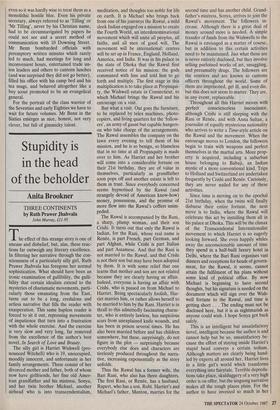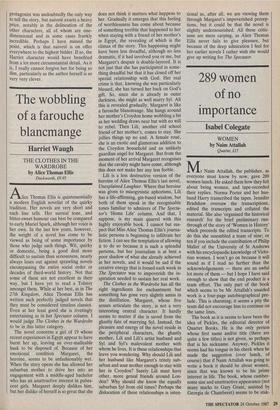Stupidity is in the head of the beholder
Anita Brookner
THREE CONTINENTS by Ruth Prawer Jhabvala
John Murray, (11.95
The effect of this strange story is one of unease and disbelief, but, alas, these reac- tions far outweigh any literary excellence. In filtering her narrative through the con- sciousness of a particularly silly girl, Ruth Prawer Jhabvala has foregone her normal sophistication. What should have been an ironic examination of gullibility, the gulli- bility that certain idealists extend to the mysteries of charismatic movements, parti- cularly those emanating from the East, turns out to be a long, credulous and artless narrative that fills the reader with exasperation. This same hapless reader is forced to sit it out, repressing movements of impatience that turn into a frustration with the whole exercise. And the exercise is very slow and very long, far removed from the excellence of the author's best novel, In Search of Love and Beauty.
The silly girl is Harriet Wishwell (pro- nounced Witchell) who is 19, unoccupied, moodily innocent, and unfortunate in her family arrangements. These consist of her divorced mother and father, both of whom now have girlfriends, her fine old Amer- ican grandfather and his mistress, Sonya, and her twin brother Michael, another airhead who is into transcendentalism, meditation, and thoughts too noble for life on earth. It is Michael who brings back from one of his journeys the Rawul, a mild sleek Indian engaged on a mission to create the Fourth World, an interdenominational movement which will unite all peoples, all faiths, and all men of good will. The movement will be international: centres will be set up in France, England, Holland, America, and India. It was in his palace in the state of Dhoka that the Rawul first received notice of his mission: the gods communed with him and told him to go forth and multiply. The first stage in this multiplication is to take place at Propinqui- ty, the Wishwell estate in Connecticut, to which Michael brings the Rawul and his entourage on a visit.
But what a visit. Out goes the furniture, to be replaced by telex machines, photo- copiers, and living quarters for the 'follow- ers', an army of gaunt but capable hangers- on who take charge of the arrangements. The Rawul assembles the company on the lawn every evening to tell them of his mission, and he is so benign, so blameless that in no time at all Propinquity is made over to him. As Harriet and her brother will come into a considerable fortune on their 21st birthday, they are of value in themselves, particularly as grandfather soon pops off and another estate is left to them in trust. Since everybody concerned seems hypnotised by the Rawul (and strangely devoid of American know-how) money, possessions, and the promise of more flow into the Rawul's coffers unim- peded.
The Rawul is accompanied by the Rani, a sharp, plump woman, and their son Crishi. It turns out that only the Rawul is Indian, for the Rani, whose real name is Renee, is part French, part German, and part Afghan, while Crishi is part Italian and part Assamese. And that the Rani is not married to the Rawul, and that Crishi is not their son but may have been adopted by them. It is with some relief that one learns that mother and son are not related because they are clearly having an affair. Indeed, everyone is having an affair with Crishi, who is passed on from Michael to Harriet. Being spectacularly foolish, Har- riet marries him, or rather allows herself to be married to him by the Rani. Harriet is in thrall to this admittedly fascinating charac- ter, who is entirely lawless, has suspicious scars from unexplained knife wounds, and has been in prison several times. He has also been married before and has children somewhere, but these, surprisingly, do not figure in the plot — surprisingly because everybody else does and characters are tirelessly produced throughout the narra- tive, increasing exponentially as the story unfolds.
Thus the Rawul has a former wife, the Bari Rani, who also has three daughters. The first Rani, or Renee, has a husband, Rupert, who has a son, Robi. Harriet's and Michael's father, Manton, marries for the second time and has another child. Grand- father's mistress, Sonya, arrives to join the Rawul's movement. The followers in- crease. Although there is a great deal of money around more is needed. A simple transfer of funds from the Wishwells to the Rawul is envisaged as a matter of course, but in addition to this certain activities need to be maintained. Just what these are is never entirely disclosed, but they involve selling purloined works of art, smuggling, and presumably drugs. The followers are the couriers and are known to customs officers throughout the world. Some of them are imprisoned, get ill, and even die, but this does not seem to matter. They are, in any event, replaceable.
Throughout all this Harriet moves with perfect conscienceless insouciance, although Crishi is still sleeping with the Rani or Renee, and with Anna Sultan, a journalist of equally mysterious nationality who arrives to write a Time-style article on the Rawul and the movement. When the entourage moves to London, the followers begin to train with weapons and perfect themselves in the martial arts. More prop- erty is acquired, including a suburban house belonging to Babaji, an Indian mystic of a more conventional kind. Trips to Holland and Switzerland are undertaken frequently by Crishi and Renee. Curiously, they are never nailed for any of these activities.
Since time is moving on to the epochal 21st birthday, when the twins will finally disburse their entire fortune, the next move is to India, where the Rawul will celebrate this act by installing them all in his palace at Dhoka. This will be the climax of the Transcendental Internationalist movement to which Harriet is so eagerly looking forward. She even happily whiles away the unconscionable amount of time they spend in a half-built luxury hotel in Delhi, where the Bari Rani organises vast dinners and receptions for heads of govern- ment, for the Rawul, it seems, cannot attain the fulfilment of his plans without some kind of political office. By now Michael is beginning to have second thoughts, but his signature is needed on the document which will sign over the Wish- well fortune to the Rawul, and time is getting short . . . The ending must not be disclosed here, but it is as nightmarish as anyone could wish. I hope Sonya got back safely.
This is an intelligent but unsatisfactory novel, intelligent because the author is and cannot help but be so, unsatisfactory be- cause the effort of staying inside Harriet's stupid head conveys a certain tedium. Although matters are clearly being hand- led by experts all around her, Harriet lives in a little girl's world which transforms everything into fairytale. Terrible depreda- tions take place, skulduggery of a very high order is on offer, but the singsong narrative makes all the rough places plain. For the author to have invested so much in her protagonist was undoubtedly the only way to tell the story, but naivete exacts a heavy price, notably in the delineation of the other characters, all of whom are one- dimensional and in some cases frankly incredible. Perhaps I have missed the point, which is that naiveté is on offer everywhere to the highest bidder. If so, the Harriet character would have benefited from a lot more circumstantial detail. As it is, I really cannot forgive her for being so dim, particularly as the author herself is so very very clever.



















































 Previous page
Previous page